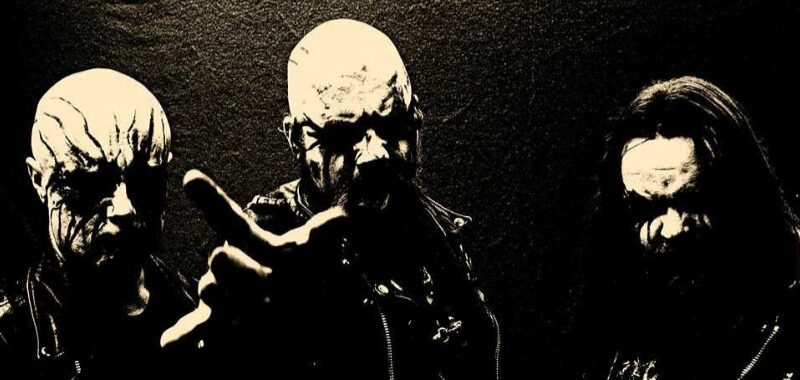Azaghal: An Overview
Formed in 1995, in Finland, Azaghal has been a stalwart of the Finnish Black Metal scene, delivering raw, intense, and authentic Black Metal deeply rooted in the old school ethos. Their sound, characterized by grim riffs, blast beats, and harsh vocals, channels the cold atmosphere and pagan spirit often associated with Nordic Black Metal. Over the years, Azaghal has maintained a consistent output of albums that capture both the ferocity and the bleak melancholy emblematic of the genre. Their lyrical themes largely revolve around Finnish mythology, paganism, nature, and anti-Christian sentiment, reflecting a deep connection to their cultural roots and Black Metal’s traditional themes.
“Helvetin Yhdeksän Piiriä” (1999)
Azaghal’s debut album, whose title translates roughly to “The Nine Circles of Hell,” immediately established their sound and vision. Raw production and grim riffing create a dark and oppressive atmosphere. The album is steeped in themes of hell, damnation, and blasphemy, setting the tone for the band’s continued exploration of dark spirituality and the rejection of Christianity.
“Mustamaa” (2000)
Continuing with a raw and primitive Black Metal sound, Mustamaa (“Black Land”) dives deeper into Finnish landscapes and mythology. The music remains aggressive yet atmospheric, emphasizing a bleak northern aura. Lyrically, it explores themes of pagan heritage and nature’s harshness, reinforcing Azaghal’s identity as custodians of Finnish Black Metal tradition.
“Helvetistä Itään” (2001)
Meaning “East of Hell,” this album marks a slight evolution in songwriting with slightly clearer production but retains its cold, raw essence. The themes continue to revolve around darkness, death, and anti-Christianity, with lyrical imagery often drawn from Finnish folklore and paganism.
“Ei Koskaan” (2004)
Translated as “Never,” this album is often considered one of Azaghal’s strongest works. The band combines relentless aggression with atmospheric passages that evoke the bleakness of the Finnish wilderness. The lyrical content reflects a firm stance against dogmatic religion and an embrace of nature’s primal forces.
“Ihmisviha” (2007)
“Ihmisviha” means “Misanthropy,” and the album delivers on its title with dark, hateful themes and a more focused and mature songwriting style. Musically, it is tighter and heavier, while the lyrics delve into human nature’s darker sides, isolation, and disdain for societal norms.
“Perkeleen Luoma” (2012)
This album continues Azaghal’s tradition of combining old-school Black Metal aggression with Finnish folk elements. “Perkeleen Luoma” (“Devil’s Creation”) lyrically explores Satanism, rebellion, and pagan spirituality with a grim poeticism. The production strikes a balance between clarity and rawness, enhancing the album’s impact.
“Vihan Tie” (2019)
“Vihan
Tie” translates as “The Path of Hate” and showcases a band still as fierce and
dedicated as ever. The music is uncompromisingly brutal with intricate riffs
and relentless drumming. The lyrics explore themes of anger, war, and the
eternal struggle against oppressive forces, maintaining the band’s
characteristic pagan and anti-Christian sentiments.
Lyrical Themes and Artistic Identity
Azaghal’s lyrics consistently draw from Finnish paganism, mythology, and a profound connection to nature’s darker and colder aspects. Their rejection of Christianity and organized religion is a recurring theme, expressed through blasphemous and anti-dogmatic poetry. The band also embraces misanthropy, personal struggle, and the harsh realities of existence, often conveyed with raw emotional intensity.
Musically,
Azaghal remains faithful to the traditional Black Metal sound, combining the
primal energy of early Norwegian Black Metal with uniquely Finnish influences.
Their work resists commercial polish in favor of a raw, visceral aesthetic that
appeals to purists of the genre.
Conclusion
Azaghal’s
discography represents a steadfast dedication to Black Metal’s core principles,
enriched by the band’s cultural heritage and unyielding spirit. From their
early raw recordings to their more refined later works, Azaghal has maintained
a compelling balance between ferocity and atmospheric depth. Their commitment
to exploring Finnish mythology, paganism, and anti-Christian themes places them
among the most authentic and respected acts in the Finnish Black Metal scene.
For fans of traditional Black Metal with a cold northern edge, Azaghal’s
catalog offers a powerful journey through darkness, nature, and ancient
spiritual rebellion.

Comentários
Enviar um comentário